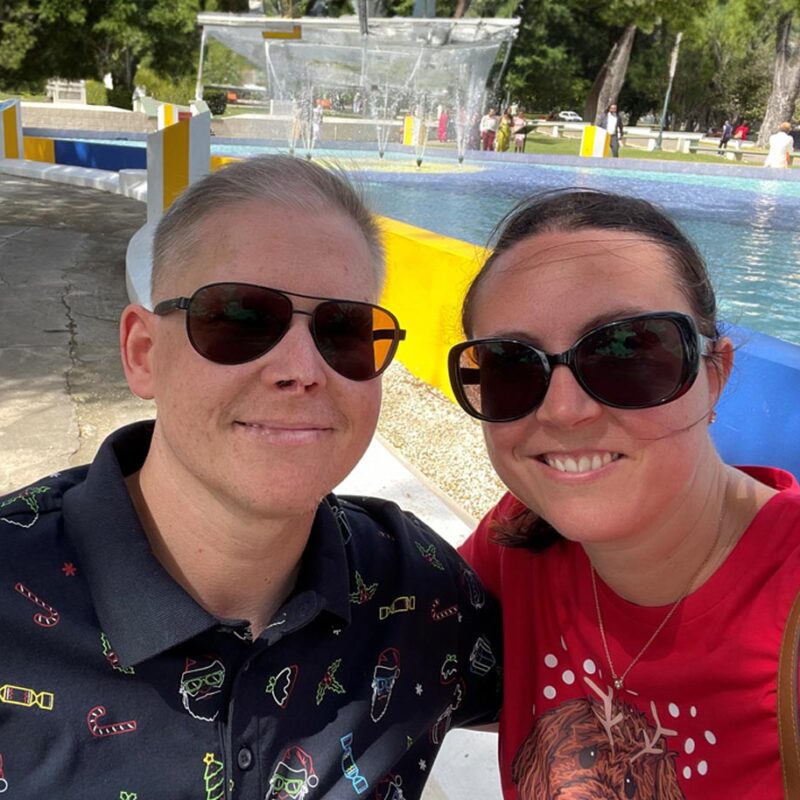Jonathan was enjoying lunch with friends just before Christmas 2024 when he began to feel unwell.
Before he knew it, he was unconscious in hospital due to sepsis. He’s now using his platform to help raise awareness of a condition that claims 48,000 lives in the UK each year.
“My sepsis story started that one afternoon, just before Christmas… I started getting very strong shivers, felt cold, couldn’t get warm, and that went into me passing out and losing consciousness,” said Labour and Co-operative Councillor for King’s Cross, Jonathan Simpson.
Jonathan went to bed for two days with a high fever – but when he tried to get up, he realised something was very wrong.
“I completely lost the use of my right leg. My foot had become so swollen and it was very, very obvious that I’d got a lot of infection,” he said.
At A&E, not everyone immediately spotted the danger – but fortunately one of the doctors recognised “all of the classic sepsis symptoms”. Jonathan was admitted to hospital and “pumped full of antibiotics.”
But he doesn’t remember much from the next 10 days: “I was so poorly. I was suffering from delirium, so I wasn’t really conscious of what was going on.”
Friends told him doctors were worried about multiple complications: “I had doctors saying that they were really concerned that I had renal failure. I had heart-related issues and lots of things happening, which I’ve never ever had before.”
After about 10 days, Jonathan regained consciousness and became more aware of his surroundings. But the infection had spread. “Sepsis had spread the infection – it was in my hip, it was in my left shoulder, and it was most noticeable in my right foot,” he explained.
He needed “two rounds of surgery in my foot and one round of surgery in my shoulder” and remained on antibiotics for about two months.
“The surgeries were pretty brutal, I have to be honest. But they did get rid of the infections,” Jonathan said.
When he finally left hospital nine weeks later, he “wasn’t really able to walk.” Recovery at home has been slow: “Five months on, I’m learning how to walk more… My mobility is impaired. I definitely have some trauma… and I do have a lot of pain following the surgery.”
For those supporting a loved one recovering from sepsis, he offers this advice: “Just be kind and patient… Support somebody step by step, day by day… And at the same time, encouraging somebody to really get out there and live their life again – but not everybody’s going to be able to do that super quick.”
He urges people to “seek support… emotional support, but also practical support… benefits advice as well if you need to have a prolonged period [off] work.”
He says recovery involves celebrating the small wins: “Little steps like getting outdoors for the first time, going to the bathroom, being able to wash yourself for the first time – those little things are massive, massive improvements.”
Jonathan is now committed to raising awareness: “I’ve written articles for my local paper… if writing something, talking about my experience helps one person, I’m very happy.”
He adds: “Your experience matters. Sharing your story, A) is therapeutic… but B) also enables your friends, your family members, your colleagues to understand this illness.”
He knew “very little” about sepsis beforehand – despite having read “high-profile cases,” including that of Lord Craig Mackinlay who lost his limbs.
“Even when I was in hospital and being told I had the signs of sepsis… I didn’t really realise that it was bad. I thought, ‘I’ll be out in probably a few days’ time’,” he said.
Jonathan wants public awareness to go further. “It needs to go possibly even further – into schools, and out into every public body… If people are aware of the signs of sepsis early, it is treatable – provided someone gets the medical care early on.”
He’s grateful for the communication and care he received in hospital. “Doctors were really clear with me about what the illness was, how serious it was, but also what treatments I was getting.” But he recognises not everyone has that experience.
He urges family members to speak up: “Don’t feel in any way you can’t ask questions to medical staff… if you come across a doctor that you don’t feel comfortable with… just say that.”
He also wants to break the stigma around vulnerability – especially among men.
“Men don’t cry. Men don’t talk about their emotions… Now, sepsis will leave you really at the hands of an awful lot of people… You are really left in a situation where you feel absolutely defenceless,” he said. “You’ve faced a very, very life-threatening illness, and it’s OK to admit that sepsis has affected you – just as much as any illness could.”





